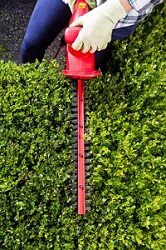Outdoor Electrical Safety

When using electrical equipment or working near power lines outdoors, weather conditions and the presence of utility equipment present safety risks that are not typically found indoors. Therefore, it’s important to operate equipment properly and be aware of potential hazards around you.
Review the following sections before working or playing outdoors:
Guidelines for operating power tools
Follow these guidelines before, during and after operating a power tool outdoors:
- Read the tool's instructions, especially all safety warnings, before use.
- Plug the cord into a three-prong outlet on a three-conductor circuit. This provides the added safety of the neutral-to-ground connection provided by the third wire.
- Inspect the tool after each use, and keep it in good working order. Replace or repair worn or defective equipment immediately.
- Keep the tool clean and store it in a dry place.
- Never use a power tool around flammable liquids such as gasoline or solvents.
- Keep the work area clean of sawdust, shavings or anything else that could pose a fire hazard.
- When using outdoor electrical appliances such as hedge trimmers or edgers, wear sturdy, rubber-soled shoes or boots. Never go barefoot.
- Never use electric tools or mowers in wet areas.
Safely maintaining outdoor lighting
Special care should be given when working with outdoor lighting to prevent injury or potential hazards, especially in wet conditions. All outdoor outlets, lighting fixtures and bulbs should be weatherproof and protected by ground fault circuit interrupter (GFCI) breakers.
And, don’t forget to turn off outdoor circuits before replacing bulbs or adjusting outdoor lighting.
Take precautions near overhead power lines
Some outdoor activities can put you in close proximity of overhead power lines. Prevent the risk of electric shock by keeping the following in mind when playing or working outdoors near power lines:
- When using a ladder, take care to keep it far from power lines
- Install your satellite dish as far from electric lines as possible, preferably at the opposite end of the house.
- Never let children fly kites, motorized airplanes or drones near power lines. While kites almost always use cotton string, wet cotton string can conduct electricity almost as well as metal string. If a kite gets stuck in a tree, check first to make sure no power lines are nearby before retrieving it. If a kite is tangled in our lines, call our Contact Center.
- When hauling a boat, make sure it clears overhead power lines and stay away from power lines when sailing.
- Don't shoot at or otherwise damage insulators on utility poles. This is extremely dangerous and against the law. Insulators keep electricity from traveling down the pole. If an insulator is broken off or damaged, anyone coming in contact with the pole could be injured or killed.
Additionally, properly selecting and locating trees around power lines is important - not only for safety, but for reliable electric service, too. For more information on planting and maintaining trees near power lines, see How to Select the Right Tree for the Location.
If you see a downed power line, always assume it is live and dangerous. Stay at least 30 feet away and immediately call 911 to report it.
Digging Near Underground Lines
Customers serviced by underground power lines should be aware of landscaping clearance and other guidelines before digging near our equipment.
Click here for information about planting near pad-mounted enclosures.
811 Call Before You Dig
State laws require that the excavator notify the appropriate State One-Call System before digging. See below for your state’s required advance notice requirement. Trained personnel will locate and mark the underground facilities for you. There is no charge for this service and it limits customer liability in case the excavation results in damage to the underground utilities.
The following work site information will be needed:

- County, city or township
- Street address
- Intersecting streets or roads
- Distance and direction from intersection
- Extent of work (front/rear/both sides)
- Date excavation will take place
- Type of work
- Your name
- Contact phone number
- Contractor contact person or other additional information
Each state One-Call Center may be contacted by telephone by dialing the 811 nationwide "Call Before You Dig" telephone number or each agency’s specific 800 telephone number (listed below). You also may contact them online at www.call811.com* or through each agency’s website (also listed below).
State One-Call Organizations
- Ohio (Illuminating Co., Ohio Edison, Toledo Edison)
48 hours from the time that the ticket is created excluding weekends and legal holidays.
Call 811 800-362-2764 OHIO811
www.oups.org*
- Pennsylvania (Met-Ed, Penelec, Penn Power, West Penn Power)
Two business days excluding the day that the ticket was created, weekends and legal holidays.
Call 811 or 800-242-1776 POCS811
www.paonecall.org*
- New Jersey (Jersey Central Power & Light)
Three business days excluding the day that the ticket was created, weekends and legal holidays.
Call 811 or 800-272-1000 NJOC
www.nj1-call.org*
- New York (Penelec only)
Two business days excluding the day that the ticket was created, weekends and legal holidays.
Call 811 or 800-962-7962 DSNY
www.digsafelynewyork.com*
- West Virginia (Mon Power, Potomac Edison)
48 hours from the time that the ticket is created excluding weekends and legal holidays.
Call 811 or 800-245-4848 MUWV
www.wv811.com*
- Maryland (Potomac Edison)
Two business days excluding the day that the ticket was created, weekends and legal holidays.
Call 811 or 800-257-7777 MUMD
www.missutility.net/maryland*
*By clicking this link you are leaving the FirstEnergy website and entering a website maintained by a third party. The third party is entirely responsible for the content of their website.
Still need help?
Contact us with your questions.

